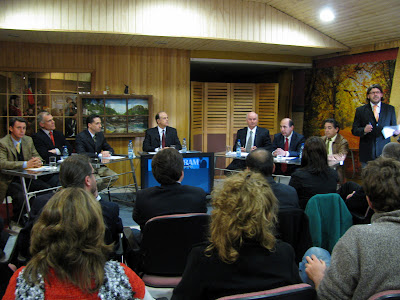- Patagonia without dams journalist Daniel Fernández returns to the RAI.
- The executive power of the average Italian assured that the water rights of the Baker and Pascua rivers were delivered to Endesa when it was a public company, in circumstances that had been processed and finalized when the company had already been transferred to private and days of Pinochet left power.
- "The origin of this project comes from a negotiated at the expense of national treasury with a serious injury to the State and hence for all Chileans, and even more behind the citizenship of the Aysen region, many of whose residents in the watershed of Baker have serious problems accessing the application as it mostly belong HidroAysén, the partnership of Endesa and Colbún "said the journalist.
" impresentable HidroAysén is showing to the public as a company that delivers accurate information when their executive vice president, Daniel Fernandez, is capable of blatantly misrepresenting to an international media and the Italian RAI national history. Now, leaving a possibility of doubt, is lying or speaking from ignorance. " This was the response that the reporter of the Defense Council of Patagonia, Patricio Segura, he entered the discussion that has arisen in recent days about the tenor of the campaign HidroAysén, where it is said that Patagonia without dams would made "misleading " to relieve the issues involved in the construction of five dams on the Baker and Pascua rivers.
Professional referred to the article " Enel, l'acqua della Patagonia sorso Tutta d'un" (" Enel, the water in one gulp Patagonia ") issued on 11 December by the Italian television RAI News 24 ( http://bit.ly/RAIparte1 ; http:// bit.ly/RAIparte2 ), where HidroAysén executive vice president, Daniel Fernández, before the journalist Enzo Cappucci consultation on how they were acquired water rights for the 5 dams, verbatim answers that "Endesa was a public company, and had water rights as a public company. And when it was sold and privatized, who bought rights paid for all value is not explicit, but that itself is implicit in the cost of company. "
" Those who know the history of privatization of Endesa, know that this statement is absolutely false, since the sale of electricity ended after the 1988 plebiscite, being in the hands of Jose Yuraszeck and other businesses, some even Pinochet previously public officials in the energy sector "said Segura. On 9 January 1989 Joseph Endesa Yuraszeck joined the DGA four requirements for 3000 cubic 155 meters per second in the Baker and Pascua rivers in Aysen, then of which the private and won power and free mass successive non-consumptive rights for hydroelectric purposes, by resolutions 39 and 53 DGA January 12, 1990, 159 and 164 of March 1 of that year . "The origin of this project comes from a negotiated national public expense, with a serious injury to the State and hence for all Chileans, and even more behind the citizenship of the Aysen region, many of whose residents in Baker Basin have serious problems in accessing this resource to belong mostly to HidroAysén, the partnership of Endesa and Colbún. To lie about this, or ignore it is not in accord with the role chief executive of a company of this magnitude . " In conclusion Segura
asked " if before the international media company executive vice president dares to blatantly distort history, perhaps because he knows that this issue is sensitive for the Italians to demonstrate the illegitimacy of origin of this project," not be willing to do the same in a communications campaign? . "
The way the system was privatized Chilean electricity during the regime of Augusto Pinochet is a topic that has gained force in recent days in light of the government's interest to sell Sebastián Piñera participation the State in various healthcare companies. The history of how private was transferred to the 80's many public companies are listed in the book " The Looting of the State economic groups in Chile " (2001) by María Olivia Mönckeberg, National Award Journalism 2009.
***
Youtube version declaration Daniel Fernández:


